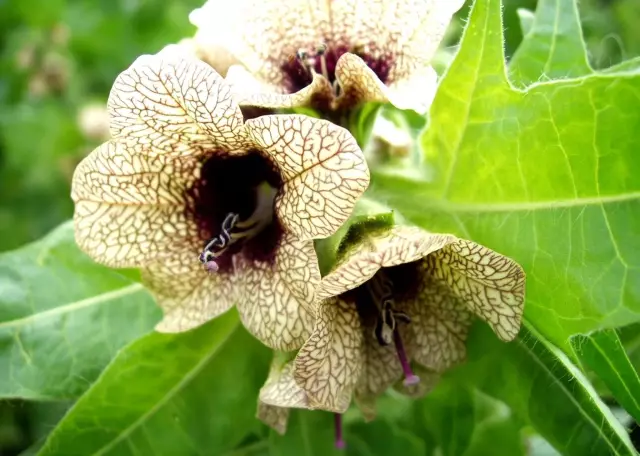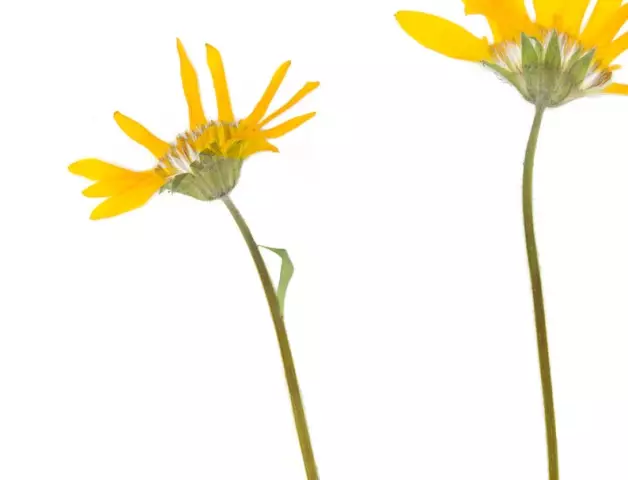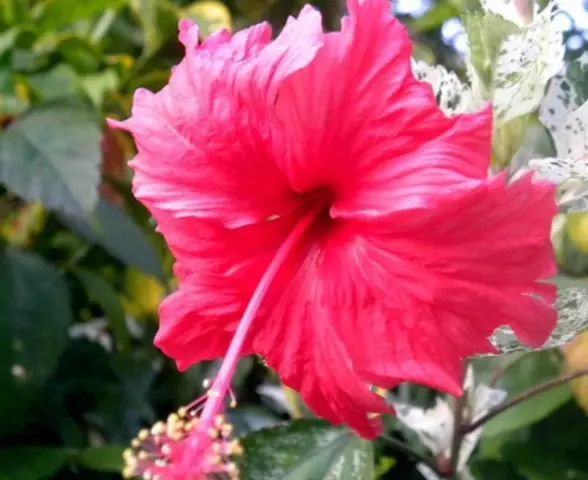- Author Rachel Wainwright wainwright@abchealthonline.com.
- Public 2023-12-15 07:39.
- Last modified 2025-11-02 20:14.
Black henbane
Instructions for use:
- 1. Chemical composition
- 2. Useful properties
- 3. Indications for use
- 4. Contraindications
- 5. Home remedies

Black henbane is a biennial, sometimes annual, winter plant belonging to the Solanaceae family and having a fleshy, thick taproot. An unpleasant and heavy odor emanates from the plant, and the plant itself is covered with sticky, glandular and soft hairs.
The stem of the plant is branched and straight, its maximum height can reach 115 cm. The leaves have a grayish-greenish tint. The flowers are quite large, their length reaches 2-3 cm, they have dense leafy curls. Blooms mainly from June to October, fruits ripen around August-September. Black henbane reproduces exclusively by seed, with one plant capable of producing on average up to 10 thousand seeds.
The plant is widespread in the Caucasus, in the European part of the CIS (middle lane), in the Crimea and in Central Asia (it is a weedy plant and grows near fences, in yards, near the walls of various buildings, in gardens and fields).
Chemical composition
In medicine, the use of black henbane is due to the content of the following chemicals in it:
- Alkaloids - tropine, hyoscyamine, 1-scopolamine (hyoscine), apogioscin, apoatropine, belladonin (in leaves and tops);
- Glycosides - hyoscyresin, chyuscerin, juscipicrin, methylesculin (in leaves and tops);
- Fatty oil containing oleic, linolenic and other acids (in seeds);
- Flavonoids, primarily rutin, coumarin derivatives (in the leaves).
Beneficial features
Black henbane can have a peripheral effect, which is associated with the presence of tropane alkaloids in it (they allow to reduce or stop spasms of the muscles of the intestines, urinary and biliary tract, inhibit the separation of gastric juice, saliva, lacrimal fluid and mucus, to a lesser extent affect the muscles of the bronchi).
The influence of the plant on the central nervous system, depending on the content of scopolamine in the raw material, is ambiguous. If the content of the alkaloid predominates, then the plant has a sedative effect, and also inhibits the processes of excitation that occur in the motor zone of the cortex.
In folk medicine, the use of black henbane is practiced as a powerful anticonvulsant, sedative, analgesic agent.
The extract from the leaves is a powerful analgesic and antispastic agent for the treatment of diseases of the gastrointestinal tract. It is included in drugs such as Astmatol and Astmatin, which are used in the treatment of bronchial asthma.
Bleached oil is a unique extract based on vegetable oil, which includes dried and coarsely ground leaves, alcohol (95%), ammonia solution (70%), sunflower oil. This tool is an oily transparent liquid with a brownish-green color and a peculiar smell. Can be used for external rubbing with neuralgia and rheumatism.
Indications for use
The properties of black henbane are used in the treatment of: erysipelas, anthrax, diphtheria, smallpox, manic-depressive psychosis, stuttering in children, neuroses, nervous tics, dermatomycosis, nymphomania, parkinsonism, cystourethritis, skin and venereal diseases, pneumonia, pediculosis, head lice., eczema, hematuria, hysteria, scabies, bronchial asthma, syphilis, diuretic phenomena, algomenorrhea, rabies, chronic bronchitis, rheumatism, cholelithiasis.
It should be remembered that in small doses, henbane preparations act sedatively (soothing), and in large doses - exciting.
Contraindications
Prescription of medicines based on black henbane is contraindicated:
- Increased intraocular pressure (glaucoma);
- Prostate adenoma;
- Pregnancy and breastfeeding;
- Childhood;
- Severe urinary disturbance.
Poisoning is possible if the seeds are eaten, which, by the way, taste good, and, of course, in cases of drug overdose. Poisoning can occur in the form of acute psychosis, sometimes even with hallucinations, it is characterized by speech and motor excitement, difficulty urinating and swallowing, dry mouth.
Home remedies from black henbane
Since ancient times, black henbane has been known as one of the most poisonous plants, therefore, preparations made on its basis should be used exclusively under the supervision of a doctor, as well as for his purpose.
Oil for grinding is prepared as follows: dried seeds in the amount of 3 teaspoons should be finely crushed and poured over with 10 teaspoons of vegetable oil, preferably olive oil. It should be insisted in a dark place for 10 days. Use the resulting product to rub problem areas with gout, rheumatism, neurological pain, bruises and lumbago.
To relieve toothache in folk medicine, it is recommended to inhale the smoke of smoldering black henbane seeds.
For alcohol tincture, the container is filled with dried leaves and poured to the brim with vodka. It is infused in a dark place for 2 weeks, filtered. It is recommended to take 2 drops of tincture per tablespoon of water for severe internal pain. In case of toothache, cotton wool moistened with the product is applied to the aching tooth.
Information about the drug is generalized, provided for informational purposes only and does not replace the official instructions. Self-medication is hazardous to health!






